Kenneth L. Gentry Jr.'s Blog, page 48
March 5, 2021
THE GREAT COMMISSION: A POSTMILLENNIAL ENTERPRISE (3)
 PMW 2021-019 by Kenneth L. Gentry, Jr.
PMW 2021-019 by Kenneth L. Gentry, Jr.
In my previous studies I have been analyzing the Great Commission as a foundational text for postmillennialism. In those studies I noted that the Commission revolves around four “all’s.” The first two all’s highlighted Christ’s authority as “all authority” and his directive to disciple “all nations.” In this study we will look at the third all: “all things.”
All Things
Christ commands us to disciple all nations. But what does he mean? The discipleship idea involves training in the Christian faith. The Greek word is matheteuo, which involves authority over another person so as to train them for service. In the Great Commission it is definitely redemptive in orientation, for it includes baptism in the Name of the Triune God. It is no simple humanitarianism; it is no social gospel.
The Great Commission does not merely speak of being a witness to all nations, else the word would have been martureo. It is not just to preach to all nations, or the word would have been kerusso. We are actually to disciple, to bring under Christ’s yoke and to train, all nations.
Dispensationalists often misconstrue this. Charles Feinberg writes that “Nothing could be plainer in the New Testament than that in this age of grace God uses the church, members of the body of Christ, to be witnesses throughout the earth.” He then refers to Matthew 28:18-20. The terminology employed by the Lord will not allow this reduction of the Great Commission. It will not tolerate the Great Commission to all nations becoming the Great Suggestion to scattered individuals.
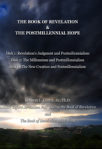 The Book of Revelation and Postmillennialism (Lectures by Ken Gentry)
The Book of Revelation and Postmillennialism (Lectures by Ken Gentry)
In the first of these three 50-minute lectures Gentry explains Revelation’s judgments to show they do not contradict postmillennialism. In the next two lectures he shows how the Millennium and the New Creation themes strongly support the gospel victory hope found in postmillennialism.
See more study materials at: www.KennethGentry.com
Certainly this entails evangelism. That is the absolutely crucial and essential starting point for Christian discipleship. Apart from the saving grace of Jesus Christ in the heart of the sinner “the carnal mind is enmity against God; for it is not subject to the law of God, nor indeed can be. So then, those who are in the flesh cannot please God” (Rom. 8:7-8). The Lord clearly taught that “as many as received Him, to them He gave the right to become children of God, even to those who believe in His name: who were born, not of blood, nor of the will of the flesh, nor of the will of man, but of God” (John 1:12-13). He also informs us that “unless one is born again, he cannot see the kingdom of God” (John 3:3).
We ought to be engaged in reaching out to the lost and presenting them the saving gospel of Jesus Christ. Historic, orthodox Christianity sees the fundamental need of man as a right relationship with God. And that cannot be gained apart from the supernatural salvation wrought by Christ: “Therefore, having been justified by faith, we have peace with God through our Lord Jesus Christ, through whom also we have access by faith into this grace in which we stand, and rejoice in hope of the glory of God” (Rom. 5:1-2).
But it does not stop there, as dispensationalists are prone to think. Megachurch fundamentalist pastor Jack Hyles once wrote of the Great Commission: “Notice the four basic verbs: (1) Go. (2) Preach. (3) Baptize. (4) Teach them again. You teach them something after you get them saved and baptized. What do you teach them? To….’observe all things whatsoever I have ed you.’…. Now what did He us to do? Go, preach, baptize, then teach what He ed us to do. So, we teach them to go, preach, and baptize, that they may teach their converts to go and preach and baptize.”
The Lord s that we should “teach them to observe all things that I have ed you” (Matt. 28:20). And it is abundantly clear that Christ did not limit His teaching to the message of individual salvation from hell. And He promised to lead His disciples into all truth (John 16:13), so everything they taught was what He would have them teach. Yet they did not limit their teaching to personal redemption, either. Had such been the case, the Gospels would have been much, much shorter, as well as the New Testament as a whole.
In His first major discourse, the Sermon on the Mount, we read of the Lord’s reaffirmation of the Law of God: “Do not think that I came to destroy the Law or the Prophets. I did not come to destroy but to fill it full measure” (Matt. 5:17). Paul states in Romans 3:31: “Do we then make void the law through faith? Certainly not! On the contrary, we establish the law.” And surely the Law of God cannot be limited solely to personal salvation. It must apply to the wider culture of man. Thus, this is one major feature of the “all things” Christ taught. Consequently, our discipleship instruction ought to include the Law of God, as well.
When we read the New Testament we discover a broad scope in the teaching of Christ and His Apostles. Their scope is as broad as the world. Christ came to save individual sinners from their sin, to be sure. But as I have said, He came also to save the “world,” the whole system of men and things. Hence, the broad world and life teaching of Christ and the Apostles. The New Testament promotes a Christian view of social duty and involvement.
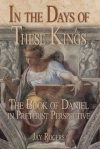
In the Days of These Kings: The Book of Daniel in Preterist Perspective
by Jay Rogers
This orthodox preterist analysis of Daniel is not a book, but a library. Extremely helpful for the postmillennial orthodox preterist.
For more study materials, go to: KennethGentry.com/
Of course, the New Testament is concerned with marriage and divorce (Matt. 5:27-32), family relations (Eph. 5:22-33), and child rearing (Col. 3:21), as all agree. But it also instructs us regarding the rich man’s duty to the poor (Matt. 25:31-46), employer-employee relationships (Eph. 6:5-9), honest wages (Luke 10:17), free-market bargaining (Matt. 20:1-15), private property rights (Acts 5:4), godly citizenship and the proper function of the state (Matt. 22:21), the family as the primary agency of welfare (1 Tim. 5:8), proper use of finances (Matt. 15:14ff), the dangers of debt (Rom. 13:8), the morality of investment (Matt. 25:14-30), the obligation to leaving an inheritance (2 Cor. 12:14), penal restraints upon criminals (Rom. 13:4), lawsuits (1 Cor. 6:1-8), and more. In doing so, it reflects and supplements the socio-cultural concern of the Old Testament, urging the people of God to live all of life under Christ’s authority, not just the inner-personal or family or church areas of life. Hence, the to “observe all things I taught you.”
Thus, the Christian discipleship program should teach the whole Word of God, which equips us for every good work (2 Tim. 3:17). The Christian disciple should be engaged in exposing works of darkness (Eph. 5:11). He should not only be confronted the negative through rebuke, but supplanting it through a challenge with the Truth and by a positive reconstructing of all of life: “The weapons of our warfare are not carnal but mighty in God for pulling down strongholds, casting down arguments and every high thing that exalts itself against the knowledge of God, bringing every thought into captivity to the obedience of Christ” (2 Cor. 10:4-5). Thus, as Paul says: “Do not be conformed to this world, but be transformed by the renewing of your mind, that you may prove what is that good and acceptable and perfect will of God” (Rom. 12:1-2).
March 2, 2021
THE GREAT COMMISSION: A POSTMILLENNIAL ENTERPRISE (2)
 PMW 2021-018 by by Kenneth L. Gentry, Jr.
PMW 2021-018 by by Kenneth L. Gentry, Jr.
In my last article I began to consider the Great Commission and its implications for postmillennialism. I am highlighting the greatness of the Great Commission as a key component of the postmillennial system. My study will focus on each of the four appearances of the word “all” in the Lord’s truly Great Commission. In this study I will focus on “all authority.”
All nations
As with “all authority,” it is important that we grasp the significance of “all nations.” The word “nations” is the Greek word ethnos. It is based on the Greek word ethos, which indicates habits or customs of people; cultural relations. Thus, ethnos speaks of collected masses of men, considered as bound together by social bonds, forming a culture.
Ethnos here does not signify merely “gentile.” The Jews themselves are called ethnos ten times in the New Testament (e.g., Luke 7:5; John 11:48; Acts 10:22). The term indicates people grouped in terms of their cultural relations, and involves Jews and non-Jews. He speaks of every culture of man, when he speaks of “all nations.” And He speaks of men in terms of their cultural relations.
 The Harrowing of Hell (by Jay Rogers)
The Harrowing of Hell (by Jay Rogers)
This postmillennial book examines the power of the Gospel, not only to overcome all opposition, but to rise far above the powers of hell. The term “Harrowing of Hell” refers to idea that Christ descended into Hell, as stated in the Apostles’ Creed.
For more Christian educational materials: www.KennethGentry.com
It is important to recognize that the Lord did not say, “disciple all men” (anthropos), as if His interest was individualistic, concerned with men only as stray individuals. Neither did He , “disciple all kingdoms” (baseleia), as if His interest was purely political. The to disciple “all nations” is directed to the conversion and discipling of the human race, as such, in all of its cultural endeavors. It begins deep within involving the personal, spiritual aspects of life. But it branches out to include the social, legal, academic, economic, and political areas of life, as well.
Thus, we see how the Great Commission is a counterpart to the Cultural Mandate. In the Commission, Christ is implementing a plan to redeem all men and nations. The Commission is not designed so that the Church might “snatch brands from the fire.” It seeks the salvation of man in his every relationship, as massed in cultures. The Great Commission not only has cultural implications, it creates a redeemed culture.
We need to be careful when we say, “Christ is my personal Savior.” Idol worshipers often had a “personal savior” that they could carry around with them wherever they went. Their gods were limited. Certainly Christ is my Savior: He intimately loves me as an individual. But too often Christians tend to imply Christ is sparingly parceled out to individuals in history.
Here, though, we see He has called us to disciple all nations as such. That is His , based on His possession of “all authority.” And He surely expects the discipleship of all nations by His people and the full accomplishment of the task under His providence, as we shall see.
Thus, the Scripture speaks of Christ very often as “the Savior of the world.” When it does so it is not setting forth the doctrine of universalism. There are those who will populate hell forever. Rather such references point to the eventual actual conversion of the world as a system, as a kosmos. The passages that speak thus clearly portray salvation in all of its fullness. These passages do not merely say, “He is the only Savior in the world,” allowing for the vast majority of men to reject Him.
Consider the strong redemptive terminology used in these passages. John 1:29: “The next day John saw Jesus coming toward him, and said, “Behold! The Lamb of God who takes away the sin of the world!” John 3:17: “For God did not send His Son into the world to condemn the world, but that the world through Him might be saved.” 1 John 2:2: “He Himself is the propitiation for our sins, and not for ours only but also for the whole world.” Romans 11:15: “For if their being cast away is the reconciling of the world, what will their acceptance be but life from the dead?” 2 Corinthians 5:19: “God was in Christ reconciling the world to Himself, not imputing their trespasses to them, and has committed to us the word of reconciliation.”
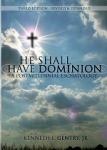
He Shall Have Dominion
(paperback by Kenneth Gentry)
A classic, thorough explanation and defense of postmillennialism (600+ pages). Complete with several chapters answering specific objections.
See more study materials at: www.KennethGentry.com
Truly Christ expects to see a redeemed world one day! The world will be saved, man’s sins propitiated, and the human race reconciled to God. Certainly He commissions us to promote this very task. We are to disciple “all the nations” so that the world as a kosmos, a system of men and things will become Christian.
It is abundantly clear that He seeks the actual discipling of all nations. They are to be brought under the yoke of the authority of the Triune God: “Go therefore and make disciples of all the nations, baptizing them in the name of the Father and of the Son and of the Holy Spirit” (Matt. 28:19). The plural “them” in the to baptize, refers back to the plural noun “nations,” which is separated from it by only one word in the Greek. And baptism is only for those under the rule of Christ’s kingdom — believers and their seed.
I will continue this study in my next posting. Hey, “posting.” As in “postmillennialism.” I like that!
Click on the following images for more information on these studies:



February 26, 2021
THE GREAT COMMISSION: A POSTMILLENNIAL ENTERPRISE (1)
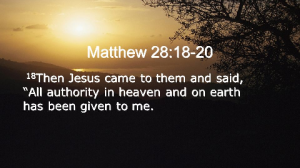 PMW 2021-017 by by Kenneth L. Gentry, Jr.
PMW 2021-017 by by Kenneth L. Gentry, Jr.
One of the most beloved passages of Scripture is the Lord’s Great Commission. Most Christians know it quite well, are able to find it in the Bible, and can cite it by heart. They also instinctively love it as the command of the resurrected Lord. Unfortunately, though it is well-known, it is poorly understood. It is loved as a foundational command for Christ’s church, giving her the marching orders of the exalted Christ. But it is seldom recognized as a strong witness to the postmillennial hope which provides an optimistic outlook on history.
In this four-part study, I will provide an exposition of the Great Commission, demonstrating its postmillennial orientation. We can see the glory of the Commission if we note the four appearances of the word “all” in it. In this lesson I will focus on the first two “alls”: Christ’s claim to “all authority” and his charge to disciple “all nations.” Let’s get started.
All Authority
It is extremely important to remember that the Great Commission is given after the resurrection. The significance of the resurrection is not fully appreciated by modern evangelicals, who are more theologically attuned to singing “There Is None Like the Lowly Jesus” than “Crown him with Many Crowns.” Their eschatology and over all view of historical progress is more shaped by the Fall of Adam than the Resurrection of Christ.

Greatness of the Great Commission (by Ken Gentry)
An insightful analysis of the full implications of the great commission. Impacts postmillennialism as well as the whole Christian worldview.
See more study materials at: www.KennethGentry.com
Prior to the resurrection, a frequent refrain of Christ was: “I can do nothing of Myself” (cf. John 5:19, 30; 8:28; 12:49; 14:10). But now after the resurrection, Christ says: “All authority has been given to Me in heaven and on earth” (Matt. 28:18). “Given” is an aorist passive verb, which speaks of this grant of all authority as occurring at a past point in time. This grant of “all authority in heaven and on earth” is given by God the Father, who according to similar terminology in Matthew 11:25; Acts 17:24; and elsewhere, is called “Lord of heaven and earth.”The Greatness of the Great Commission
This investiture of Christ with universal authority is a frequent theme of Scripture. Acts 2:30-31, the passage which the Lord used to deliver me from dispensationalism, reads: David “being a prophet, and knowing that God had sworn with an oath to him that of the fruit of his body, according to the flesh, He would raise up the Christ to sit on his throne, he, foreseeing this, spoke concerning the resurrection of the Christ…” (Acts 2:30-31). Here that investiture with kingly authority at His resurrection is to the Messianic throne of David. He is seated there in confident expectation of victory, as Peter points out by citing Psalm 110:1 in Acts 2:34: “For David did not ascend into the heavens, but he says himself: The LORD said to my Lord, Sit at My right hand, till I make Your enemies Your footstool. Therefore let all the house of Israel know assuredly that God has made this Jesus, whom you crucified, both Lord and Christ” (Acts 2:34-36). (Incidentally, Psalm 110:1 is in the New Testament the most frequently cited and alluded to passage from the entire Old Testament.)
Romans 1:4 says: He is “declared to be the Son of God with power, according to the Spirit of holiness, by the resurrection from the dead.” Again we see that He was invested with authority as the Son of God at the resurrection.
This great theme of “all authority in heaven and on earth” is echoed in Ephesians 1:19-22: “His mighty power [was] worked in Christ when He raised Him from the dead and seated Him at His right hand in the heavenly places, far above all principality and power and might and dominion, and every name that is named, not only in this age but also in that which is to come. And He put all things under His feet, and gave Him to be head over all things to the church.” follows suit:
Therefore God also has highly exalted Him and given Him the name which is above every name, that at the name of Jesus every knee should bow, of those in heaven, and of those on earth, and of those under the earth.”
The Truth about Postmillennialism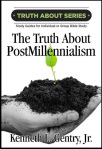 By Ken Gentry
By Ken Gentry
A group Bible study guide for explaining the optimistic prophetic hope for this world to be accomplished before Christ’s Second Coming. Establishes the postmillennial system in both the Old and New Testaments. Touches on key eschatological issues, such as creation, covenant, interpretive methodolgy, the great tribulation, the Book of Revelation, the Jewish Temple, and more. It presents and answers the leading objections to postmillennialism.Twelve chapters are ideal for one quarter of Sunday School.
See more study materials at: www.KennethGentry.com
What, then, is the nature of this grant of “all authority”? The “all” here is used in the distributive sense. It indicates “all kinds” of authority; authority in every realm. He possesses every kind of authority in heaven (i.e., in the spiritual realm) and on earth (i.e., in the temporal realm). He does not claim authority only over the Church or over individual redeemed men. He claims authority over the family, education, business, politics, law, medicine — all areas of life.
The “all authority in heaven and on earth” reflects God’s authority in Matthew 11:25, as we have mentioned: “I thank You, Father, Lord of heaven and earth.” We must ask ourselves: In what areas of life is God’s authority limited? Obviously in no area, for “the earth is the Lord’s, and all its fullness, the world and those who dwell therein” (Psa. 24:1). When you call Jesus “Lord,” you are not just speaking of His Lordship over your spiritual life as an individual. You are affirming His lordship in all areas of life, in whatever calling you or anyone else undertakes “on earth.” Truly this is a Great Commission.
But there is more! See you next time.
Click on the following images for more information on these studies:


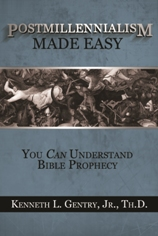
February 23, 2021
DON’T BE A RETREATIST
 PMW 2021-016 by Andrew George (Caldron Pool)
PMW 2021-016 by Andrew George (Caldron Pool)
Gentry note: This is an excellent practical article by an Australian Reformed Christian that I thought my readers would appreciate.
Far from the drama and noise of our home city of Washington, D.C., my family and I spent some quality time immersing ourselves in the beauty of the Southern Arizona mountains this last week. I was reminded that our world, as dangerous as it might be, still belongs to the God who holds it all together by his sovereign power.
Exploring God’s creation also ignited a heightened awareness of his intricate artistry, pointing me to the praise of the Father as Creator. Meditating on these realities was a much-needed refreshment, given the discouraging occurrences at our nation’s capital as of late.
I was also reminded that regardless of America’s present trajectory, this world still belongs to the Father, and America is no less a part of it (Psa 24:1). Christians in America, therefore, need not fear or retreat into spiritual enclaves. Instead, we must wage war against the forces of evil as soldiers under the authority of Christ, seeking to make disciples and win our nation for him (Matt 28:18).
Sadly, a distinctly biblical and Reformed-transformational view of Christ and culture is not the norm in evangelical American circles today. In fact, in light of our current cultural decline, a number of common slogans get thrown around a lot, with good intentions but often idle results. One of those slogans is: “No matter who is president, Christ is King.”
 Political Issues Made Easy
Political Issues Made Easy
by Kenneth Gentry
Christian principles applied to practical political issues, including the importance of borders, the biblical warrant for “lesser-of-evils” voting, and more. A manual to help establish a fundamentally biblical approach to politics. Impressively thorough yet concise.
See more study materials at: www.KennethGentry.com
No doubt there is a lot of weightiness and biblical truth to that statement. The mediatorial kingship of Christ, in its most basic form, teaches us that Christ is King of the nations. However, the statement itself can often be used as justification for passivity and withdrawal from civic engagement.
Christ is indeed King, but he is also King of kings and President of presidents, who uses his church as a prophetic voice to call civil rulers to repentance (Jonah 3:6). Moreover, Christ’s kingship calls his people to be linked, not to sin and sloth, but to cultural dominion over all areas of life, whether it be the arts, business, education, or politics (Gen 1:28).
Another common phrase is often perpetually recycled by Christians who desire to be counter-cultural: “God’s kingdom is not of this world.” This statement is an allusion to Jesus’ words in John 18:36. Far too often, Jesus’ words are used to caution Christians from pursuing involvement in politics or other matters that concern a “world” outside of the kingdom.
However, it is important to note that the term “world” in John 18:36 is a reference to the “evil world system” under the influence of Satan (cf. 1 John 5:19), not to the “material world” which God himself declared to be “good” (Gen 1:31). Creation itself is groaning under the curse of the fall, longing to be set free (Rom 8:22). Cosmic sanctification, therefore, cannot be ignored.
Granted, the prevailing culture of our time can cause the Christian to be overwhelmed. It almost seems as though we’re grasshoppers fighting against a giant. Same-sex marriage is law. Biden won. Abortion is legal. Churches are being shut down as non-essential services. As a result, far too many believers are treating the Christian faith as nothing more than an escape route to get to heaven. “This world is not our home,” they say. “We’re just pilgrims passing through.”
Redeeming Pop Culture
by T. M. Moore
Why is it important for us not to ignore the culture around us? How can we engage, influence, and advance pop culture, and how can we put popular forms to good use in God’s kingdom? Moore urges us neither to flee from popular culture nor to immerse ourselves in it blindly.
See more study materials at: www.KennethGentry.com
To be sure, the Bible does teach that Christians on this earth are pilgrims (Jer 50:5). However, the idea that we were not made for this world because we were made for another, is utterly misleading. For one thing, entrance into heaven as disembodied spirits will not be our permanent dwelling place. When Jesus returns at the final resurrection, the meek shall inherit “the earth,” not some other planet (Matt 5:5).
All of this means Christians should, under the authority of Christ, engage the culture for its redemption. The gospel of the kingdom is not a one-way bus pass to heaven, but the rule of King Jesus in the world as he places his enemies under his feet (Matt 4:23; 1 Cor 15:25).
We’re not going to be leaving our humanity behind to join Jesus in the spiritual realm. We’re going to be returning to the same (renewed) earth where every nation and living creature will worship Jesus as Lord for eternity (Rev 5:13).

Andrew George (Dual MA, Reformed Theological Seminary, Washington, D.C.; BMS, Deakin University, Melbourne) is a Christian, husband, father, Australian-American, and gospel recording artist. He creates lyrical theology for the wider church and serves as a member of the Orthodox Presbyterian Church. You can learn more about his work at ageorgemusic.com
February 19, 2021
DO POSTMILLENNIALISM & PRETERISM DIFFER?
 PMW 2021-015 by Kenneth L. Gentry, Jr.
PMW 2021-015 by Kenneth L. Gentry, Jr.
I frequently receive a question regarding the difference between preterism and postmillennialism. Some folks are confused as to whether they contradict each other or whether they are speaking of the same thing. Let me briefly distinguish the two theological concepts.
Preterism
The word “preterist” is the transliteration of a Latin word that means “passed by.” The orthodox preterist sees certain passages as referring to the destruction of Jerusalem and the temple in AD 70, though many evangelicals understand these to be speaking of the second coming of Christ at the end of history.
The Beast of Revelation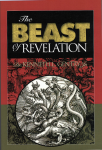
by Ken Gentry
A popularly written antidote to dispensational sensationalism and newspaper exegesis. Convincing biblical and historical evidence showing that the Beast was the Roman Emperor Nero Caesar, the first civil persecutor of the Church. The second half of the book shows Revelation’s date of writing, proving its composition as prior to the Fall of Jerusalem in A.D. 70. A thought-provoking treatment of a fascinating and confusing topic.
For more study materials, go to: KennethGentry.com
The second coming and the AD 70 judgment of Christ on Jerusalem are often spoken of with similar language. This is because they are theologically related concepts. The AD 70 holocaust is a microcosmic picture of the final day of history when Christ returns in judgment. That is, AD 70 is small, historical picture or advanced sample of what the final judgment will be like.
Preterism has nothing necessarily to do with postmillennialism. There are preterist postmillennialists and there are historicist postmillennialists. Both are true forms of postmillennialism. There are also preterist amillennialists. Thus preterism does not commit one to any particular eschatological system.
Preterism is more of a hermeneutic tool than a theology. That is, it helps us understand certain passages without committing us to a particular theological position.
Postmillennialism
Postmillennialism is a theological position on “the last things” that are to occur toward the end of history, an eschatological school of thought. Postmillennialism is an optimistic eschatological system that believes that Christ’s kingdom is currently present in history and will gradually win a dominant sway over men and nations as the gospel makes fuller progress in the world.
Postmillennialism holds to a future, single, final coming of Christ (with no separate rapture), a general resurrection of the dead (the saved and the lost simultaneously), and a general judgment of the saved and the lost in one setting.
Three Views on the Millennium and Beyond
(ed. by Darrell Bock)
Presents three views on the millennium: progressive dispensationalist, amillennialist, and reconstructionist postmillennialist viewpoints. Includes separate responses to each view. Ken Gentry provides the postmillennial contribution.
See more study materials at: www.KennethGentry.com
Thus, postmillennialism looks for the growing influence of the gospel in history before the end comes. After a long time of dominance, Christ will return to resurrect and judge all men and end history while establishing the eternal, consummate order.
Conclusion
Consequently, preterism and postmillennialism are altogether different concepts. Preterism is basically a hermeneutic, whereas postmillennialism is a theological system. They may occur simultaneously in one’s worldview, or they may be found in differing systems of thought.
Click on the following images for more information on these studies:


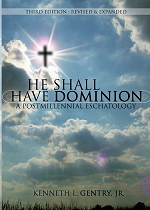
February 16, 2021
CHRIST’S RESURRECTION & THE AGE TO COME (Richard Gaffin)
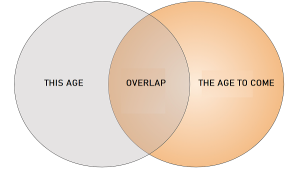 By Richard B. Gaffin (The Gospel Coaltion)
By Richard B. Gaffin (The Gospel Coaltion)
Gentry note: Dr. Gaffin is a noted Reformed theologian who has done much study in the theological two-age construct. Though he is amillennial, postmillennialism and amillennialism share much in common. Indeed, until the early 1900s the two used to be one eschatological option. Below is a helpful article on the topic of the two ages
THE RESURRECTION OF CHRIST AND THE AGE TO COME
By Richard B. Gaffin, Th.D.
Definition
The resurrection of Christ as it relates to the “age to come” and the eschatological resurrection in Scripture.
Summary
This essay will examine the “two age” outlook of the biblical writers and the arrival of the age to come in the resurrection of Christ. In the resurrection of Christ the age to come (future) has come (present) and is shared in the experience of those united to Christ by the Spirit.
The Age to Come in the New Testament
In the New Testament the expression “the age to come” (“that age”) is paired in contrast with “this age” (“this time”) or simply “the age” (“the ages”) — either explicitly (Matt. 12:32; Mark 10:30; Luke 20:34‒35; Eph. 1:21) or more often by implication (e.g., Matt. 13:39‒40; 28:20; 1Cor. 1:20; Gal. 1:4; Heb. 6:5; 9:26).
 Why I Left Full-Preterism (by Samuel M. Frost)
Why I Left Full-Preterism (by Samuel M. Frost)
Former leader in Full Preterist movement, Samuel M. Frost, gives his testimony and theological reasoning as to why he left the heretical movement. Good warning to others tempted to leave orthodox Christianity.
See more study materials at: KennethGentry.com
This two age distinction first emerges in Second Temple Judaism during the intertestamental period and is taken over from there by Jesus and several New Testament writers. This is not a problem for the doctrine of the inspiration of Scripture. At issue is whether or not this development in later Jewish theology, though uninspired, accurately reflects the teaching of the Old Testament as God’s Word. In fact it does, so that this observation about Paul’s usage also applies to its presence elsewhere in the New Testament: “There is no escape from the conclusion that a piece of Jewish theology has been here by revelation incorporated into the Apostle’s teaching” (Vos, The Pauline Eschatology, p. 28, n. 36; emphasis added; for a thorough discussion of the two age construction see chap. 1, esp. pp. 36-41, including the diagram in n. 45).
The words for “age” when they are used to make this distinction — in Hebrew, Aramaic, and Greek, and subsequently after the New Testament was written, in Latin — also have the sense of “world” or “universe” (e.g., in the New Testament, Heb. 1:2; 11:3). In other words, a comprehensive time word also took on an all-inclusive spatial connotation. The distinction, then, is between this world-age and the world-age to come.
The two age construction as originally formulated functions to express the overall historical-eschatological outlook basic to the teaching of the Old Testament, especially the prophets. It covers the entire flow of time, the whole of history, from its beginning at creation up to and including its consummation. On the one hand, this age is provisional, pre-eschatological. It is the present world, originally good (Gen. 1:31) but now subsequent to the fall marked fundamentally by sin, corruption, imperfection, and death. The age to come, in contrast, is the final world order, the eschatological age of righteousness, incorruption, perfection, and life. It is coterminous with the coming kingdom of God and the new heavens and new earth. In sum, the two world-ages in their relationship are comprehensive, consecutive, and antithetical.
The division point between them — “the end of the age,” when this age ends and gives way to the age to come — is tied to the coming of the Messiah (in the New Testament, see especially Matt. 24:3). Clearly, then, Jesus and the New Testament writers could not simply take over unchanged the two age construction at hand in the Judaism contemporary to them. Why? Because for that Judaism (as continues to be true for Orthodox Judaism today) the coming of the Messiah — the turning point of the two ages, the great inaugurating eschatological event — has not yet occurred; it is still future. For the New Testament, however, this decisive, turn-of-the-ages event has already taken place; the Messiah has already come in the person and work of Jesus.
According to the New Testament the coming of the Messiah prophesied in the Old Testament has a dual fulfillment. The promised Messiah has already come in “the fullness of time” (Gal. 4:4; cf. Eph. 1:10). This expression, often misunderstood for an especially auspicious time mid-stream in the ongoing course of history, refers rather to the culmination of history, to the filling up of the time of the present world. Its affinity is with the two age distinction; it indicates the end of this age and the dawning of the age to come. With the coming of Christ, “… the end of the ages has come” (1Cor. 10:11).
 The Book of Revelation and Postmillennialism (Lectures by Ken Gentry)
The Book of Revelation and Postmillennialism (Lectures by Ken Gentry)
In the first of these three 50-minute lectures Gentry explains Revelation’s judgments to show they do not contradict postmillennialism. In the next two lectures he shows how the Millennium and the New Creation themes strongly support the gospel victory hope found in postmillennialism.
See more study materials at: www.KennethGentry.com
The coming of the Messiah, however, will also be in the future. Having departed he will appear again a second time (Acts 1:11; Heb. 9:28). So, then, when is “the end of the age”? Tied as it is to the two-fold coming of Christ, it is both past (Heb. 9:26) as well as still future (Matt. 28:20). The age to come has already begun and will also arrive in the future.
It is apparent, then, that for the New Testament writers to continue using the two age construct a significant modification was necessary. In terms of the three defining factors noted above, both the comprehensive scope of the two ages taken together and the antithesis between them remain untouched, but the two ages can no longer be viewed as simply consecutive, the one age following the other. Rather, with the coming of Christ that has already occurred the two ages are now also concurrent.
The first and second comings of Christ, though widely separated in time as they now are, are not unrelated events; they are best seen as two stages of one coming. During the interim between them, “this present evil age” (Gal. 1:4) continues its course but the age to come has dawned and is present as well; the two ages while still consecutive also overlap.
The Age to Come and the Resurrection of Christ
Where in this necessarily modified New Testament use of the two age scheme does the age to come begin? A general answer is with the arrival of Christ in history, with his incarnation and earthly ministry. The New Testament, however, disposes us to be more precise. Because of the unique nature and demands of the messianic ministry of Jesus to be the Savior of sinners as he came to finally inaugurate the kingdom of God, it was necessary that “he has appeared once for all at the end of the ages to put away sin by the sacrifice of himself” (Heb. 9:26). Consequently, the earthly ministry of Christ divides into two basic, sharply contrasting stages. The first is marked fundamentally by his atoning, sin-bearing humiliation and suffering, followed by the second stage of his permanent exaltation and glorified existence.
The transition point between these two stages occurs at the conclusion of his earthly ministry in his death and resurrection, when he passed from his state of humiliation into his state of exaltation, when God “highly exalted him and bestowed on him the name that is above every name” after and because he had been “obedient to the point of death, even death on a cross” (Phil. 2:8‒9). This climactic transition for Christ is in fact the specific turning point of the two ages.
The age to come, then, begins at Christ’s resurrection or, more broadly along with his ascension, with his exaltation.1 This is made especially clear in Paul’s teaching on the resurrection.
The Age to Come, the Resurrection of Christ, and the Future
“But now Christ has been raised from the dead, the first fruits of those who are asleep” (1Cor. 15:20 NASB). Implicit in this use of “firstfruits” is the thought that underlies and controls the entire argument in this chapter for the resurrection of the body, and for that matter much of the whole of Paul’s teaching on the resurrection.
The background for the use of this agricultural metaphor is the firstfruits sacrifices in the Old Testament (e.g., Exod. 23:16, 19; Lev. 23:10, 17, 20), particularly the organic connection or unity between the firstfruits and the rest of the harvest. The offering up of the first part of the harvest to God was a thanksgiving gift acknowledging the entire harvest as his gift to Israel.
Applied to the resurrection, then, the bodily resurrection of Christ and the future bodily resurrection of believers cannot be separated. Christ’s resurrection is the “firstfruits” of the resurrection-“harvest,” as Paul surely intends the metaphor to be extended; “He is the first of a great harvest of all who have died” (NLT; cf. v. 23: “But each in his own order: Christ the firstfruits, then at his coming those who belong to Christ “).2
It is often said, rightly, that Christ’s resurrection is the guarantee of the believers’ resurrection. . . .
To finish reading the article: click

Perspectives on Pentecost (Richard Gaffin)
A careful examination of the New Testament teaching on the gifts of the Spirit. Makes a case for the cessation of tongues at the close of the apostolic era. Gaffin is professor emeritus of biblical and systematic theology at Westminster Theological Seminary, Philadelphia.
See more study materials at: www.KennethGentry.com
February 12, 2021
“PERILOUS TIMES” IN POSTMILLENNIALISM?
 PMW 2021-013 by Kenneth L. Gentry, Jr.
PMW 2021-013 by Kenneth L. Gentry, Jr.
In 2 Timothy 3:1 we find a passage that seems to undercut the postmillennial optimism for the historical long run. There Paul writes: “realize this, that in the last days difficult times will come.”
Amillennialist Kim Riddlebarger sees this passage as a problem for those who hold the prospect of a victorious church: “Throughout the last days, some will distort the gospel to tickle itching ears and gather followers to themselves.” He continues in response to postmillennialism: “Paul warned us that this lamentable state of affairs is an inevitability for Christ’s church.”
Dispensationalists agree. Wayne House and Thomas Ice argue that “the Bible speaks of things progressing from ‘bad to worse,’ of men ‘deceiving and being deceived’ (2 Timothy 3:13), we look out at our world and see how bad things really are.” John Walvoord concurs: “With the progress of the present age, in spite of the dissemination of the truth and the availability of Scripture, the world undoubtedly will continue to follow the sinful description which the Apostle Paul gave here.” Wiersbe agrees: “Passages like 1 Timothy 4 and 2 Timothy 3 paint a dark picture of the last days.”
 The Harrowing of Hell (by Jay Rogers)
The Harrowing of Hell (by Jay Rogers)
This postmillennial book examines the power of the Gospel, not only to overcome all opposition, but to rise far above the powers of hell. The term “Harrowing of Hell” refers to idea that Christ descended into Hell, as stated in the Apostles’ Creed.
For more Christian educational materials: www.KennethGentry.com
Such interpretations of this passage, however, are exegetically flawed and anti-contextual. Nothing taught in these verses is contra-postmillennial. Note the following observations.
First, Paul’s original focus
He is dealing with a particular historical matter in the first century. He is speaking of things that Timothy will be facing and enduring (2Ti 3:10, 14). He is not prophesying about the constant, long-term, unyielding prospects for all of history. Likewise, when Paul writes to the church at Corinth complaining that “it is actually reported that there is immorality among you” (1Co 5:1), we should not lift it from its context as a universal principle applying to all churches. He is writing specifically to them.
Second, Paul’s actual point
The text does not demand unrelenting bad times lie before the church in all of history. And though difficult “times” (kairoi) will come during the last days (the period between the first and second advents), this does not demand a pessimistic position. The Greek term Paul employs here is kairoi, which indicates “seasons.” It is the logical error of quantification to read this reference to (some) “seasons” of difficulty as if it said all seasons will be difficult. The “difficult times” (kairoi chalepoi) are “qualitatively complexioned and specifically appointed seasons.” Postmillennialists are well aware of the “seasons” of perilous times that beset the church under the Roman Empire and at other times.
Third, Paul’s misunderstood nature
This passage does not teach historical decline accelerating in history. Citing 2 Timothy 3:13 in the debate leaves the unwarranted impression that things shall irrevocably become worse and worse in history. But the verse actually says: “evil men and impostors will proceed from bad to worse, deceiving and being deceived.” Paul is speaking of specific evil men becoming ethically worse, not more and more evil men becoming increasingly dominant. He is speaking of their progressive personal degeneration, i.e., the progressive anti-sanctification of evil men. Paul says absolutely nothing about a predestined increase in the number and power of such evil men.
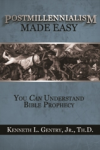
Postmillennialism Made Easy (by Ken Gentry)
Basic introduction to postmillennialism. Presents the essence of the postmillennial argument and answers the leading objections. And all in a succinct, introductory fashion.
See more study materials at: www.KennethGentry.com
Fourth, Paul’s postmillennial balance
He balances his teaching with a note of optimism. As a good postmillennialist, Paul clearly informs Timothy that these evil men (cf. 2Ti 3:1) “will not make further progress; for their folly will be obvious to all” (2Ti 3:9). Since God places limits on those evil-doers, Paul speaks as a man who expects victory. How different from the widespread, pessimistic conception of the progressive, limitless power of evil in our day. Paul’s conceives of the ultimate, long term impotence of evil in history.
 The Beast of Revelation (246pp); Before Jerusalem Fell: Dating the Book of Revelation (409pp); Navigating the Book of Revelation: Special Studies on Important Issues (211pp).
The Beast of Revelation (246pp); Before Jerusalem Fell: Dating the Book of Revelation (409pp); Navigating the Book of Revelation: Special Studies on Important Issues (211pp).
In the Logos edition, these volumes by Ken Gentry are enhanced by amazing functionality. Important terms link to dictionaries, encyclopedias, and a wealth of other resources in your digital library. Perform powerful searches to find exactly what you’re looking for. Take the discussion with you using tablet and mobile apps. With Logos Bible Software, the most efficient and comprehensive research tools are in one place, so you get the most out of your study.
For more study materials, go to: KennethGentry.com
February 9, 2021
MY HYPER-PRETERIST FRUSTRATIONS (2)
 PMW 2021-012 by Kenneth L. Gentry, Jr.
PMW 2021-012 by Kenneth L. Gentry, Jr.
In my previous posting I opened a quick two-part testimonial explaining why I do not like interacting with Hyper-preterists. Their argumentative method is terribly frustrating. I will now continue with and conclude my testimonial.
REGARDING PRESTON’S THIRD ARTICLE
Preston:
He writes: “The reader needs to remember, as I have documented, that Gentry takes a decidely [sic] and admittedly non-historical, non-creedal view of Revelation.” A few paragraphs later, he writes: “Gentry, when defending his own unorthodox, non-historical, non-creedal views that stand in opposition to the long standing scholarly consensus on Revelation…”
Gentry:
Once again, Preston is confused. What ecumenical creed takes a position on the interpretation of the Book of Revelation? He simply does not understand what creeds say, what they are, or how they function in evangelicalism. Creeds arose in antiquity in order to summarily instruct new converts in the faith and to counter doctrinal error arising in the church. They make no mention of how to interpet the Book of Revelation.
Preston:
Preston claims that I argue that: ‘the apostles were sinful men [which] proves they did not know what they were asking about!’ (p. 6).”
My reply:
Preston is once again quite confused. Consider this fact: the apostles remained “sinful men” their entire lives, until they died and left this earth. Thus, if I argued that their being sinners “proves” that they did not know what they were saying, I would be discounting everything they said — because they remained sinners until they died and entered into heaven. That would be ridiculous for any Christian to assert. Rather, I said they had a “‘sinful dullness’ on several occasions.” But they were sinners on all occasions! Preston has a frustrating tendency to re-cast his opponents arguments in a bad light.
Greatness of the Great Commission (by Ken Gentry)
An insightful analysis of the full implications of the great commission. Impacts postmillennialism as well as the whole Christian worldview.
See more study materials at: www.KennethGentry.com
Preston:
“Reader, Gentry did argue that the apostles misunderstood because they were ‘sinful men.’ He has been caught in his own words and is now denying them — or trying to explain them away!” A little later Preston states: “ note how Gentry doubles down on the “sinful dullness” of the apostles, even though he claims that I misrepresented his comments in this regard. No, I did not.” Still later Preston states: “Gentry most assuredly DID ascribe the apostles confusion to their being sinful men, possessing ‘sinful dullness.’”
My reply:
Preston simply is not thinking clearly here. Not only do I never charge in this context that the Apostles’ problem is that they were “sinful men.” His quote marks make his reader think that I said that — and that this is my argument for their confusion. But being a “sinful man” is not the same thing as suffering from “sinful dullness.” We are always sinners, but not always sinfully dull. By God’s grace and the sanctifying influence of his Spirit our sinful condition does not always dominate us so that we never think clearly.
Preston:
Preston complains regarding the commentators who disagree with him: “are we to attribute such utter, abject ignorance to Jesus’ apostles? To do so stretches credulity far beyond it limits.” Then he writes in response to me: “The commentators may not use those precise words, but they assuredly do — as Gentry — accuse the apostles of possessing sinful dullness, and thus, being confused.”
My reply:
Preston exaggerates and overstates his case constantly. Here he speaks of the Apostles being dull as if such could be characterized as “utter, abject ignorance.” And then he tries to write this off by a wave of the hand: “The commentators may not use those precise words.” In fact, the commentators use words quite different from Preston’s characterization.
Preston:
After citing my concern regarding his attitude, he responds: “Evidently it is wrong, arrogant, ridiculous and childish for Preston to challenge the views of the scholars who disagree with him.”
My reply:
Here we have another overstatement. Again: he has a tendency to take an argument from an opponent and re-cast it in a bad light. Where do I say his attitude is “childish”? I never use that term or even imply it! I am concerned with adult error, not childishness.
Nevertheless, in the conclusion of his third article Preston does declare me to be “childish.” He writes that my argument “is literally childish and petulant, the furthest thing from a serious, scholarly analysis of my work.” Not just figuratively childish, mind you. But literally!
I must admit. though, that he is correct. After making my arguments I have read a number of journal articles by young children who make the same arguments as mine regarding a narrative critical analysis of Matthew 24:3, the historical complexities of first-century rabbinic scholarship, and the didactic failure of the first-century synagogue system in Jesus’ day. I found these articles in several of the leading children’s journals: Children’s Magazine, Ladybug Magazine, Ranger Rick, The Week Junior magazine, and Highlights for Children.
Not only so, but I will admit that my argument is the “furthest thing from a serious, scholarly analysis.” I have researched the matter and found that according to The Guinness Book of World Records (p. 544), no scholar has ever gotten farther from a serious analysis than I did. At least I was mentioned in Guinness, so I’ve got that going for me!
(But since Preston does not have a sense of humor, I should explain that my statements just above are tongue-in-cheek.)
Preston:
“And make no mistake, Gentry stands in direct opposition to the Westminster Confession of Faith, the ‘second Bible’ of Gentry’s Reformed views, in regard to the identity of the Man of Sin, in 2 Thessalonians 2.”
My reply:
Though he calls on his reader to “make no mistake,” Preston here makes another mistake. He does not realize that American Presbyterianism (to which I have subscribed by my ordination vows) removed the statement about the “man of sin” in its 1788 revision. WCF 25 previously stated (in part): “Nor can the pope of Rome, in any sense, be head thereof: but is that Antichrist, that man of sin, and son of perdition, that exalteth himself, in the Church, against Christ and all that is called God.” The 1788 revised Confession dropped all reference to the pope as “that man of sin,” by stating merely: “there is no other head of the church but the Lord Jesus Christ. Nor can the pope of Rome, in any sense, be head thereof.”
But again, and more importantly, this is a denominational confession not an ecumenical creed; it defines Presbyterianism, not Christianity. There is an enormous difference between the two. Preston does not seem to understand the difference. Presbyterianism is a particular movement within historic orthodox Christianity.
Preston:
“Gentry is conveniently ignoring the indisputable fact that Jesus explained the parable to them, and applied Daniel 12.”
My reply:
Preston overstates his case. Again. It is not an “indisputable fact” that Jesus applied Daniel 12 to his kingdom parables. Jesus may be doing this. Or he may simply be engaging in an allusion to Daniel or a “re-application”of it, whereby he borrows the language and applies it in a wholly different context. If this is the case, it would be like his borrowing and re-applying the language of the collapse of Babylon and Idumea to Jerusalem in AD 70. This is why many scholars do not mention Daniel 12 when discussing Matthew 13. And they surely would if it were an “indisputable fact.” But it simply is not “indisputable,” though that grandiose statement sounds good for Preston’s followers.
Preston:
He correctly cites me as stating: “Preston charges: ‘Stunningly, the fact is that Kenneth Gentry all but accuses the apostles of lying.’” He then cites me as stating: “it takes an amazing amount of arrogance to say they were lying.” But then a part of his response is: “While Gentry does not overtly call the apostles liars, he makes the unproven assertion that ….”
My reply:
Note that he is stunned that I accuse the Apostles of “lying.” And he complains that I engage in “an amazing amount of arrogance” by saying “they were lying.” But then he admits I did not do so! I did not “overtly call the apostles liars.” How can I stun readers and engage in amazing arrogance regarding something I did not say? But then, once again by the wave of his hand, he sweeps away his bold overstatement by admitting I did not actually say that!
He Shall Have Dominion
(paperback by Kenneth Gentry)
A classic, thorough explanation and defense of postmillennialism (600+ pages). Complete with several chapters answering specific objections.
See more study materials at: www.KennethGentry.com
Preston:
He correctly quotes me as stating: “Despite [Preston’s] quotation marks, I never made that statement.”
My reply:
Then he waves his hand once again and says: “Well, I was putting Gentry’s sentiments, and those of the scholars, into a quote for convenience sake.” But it is not very convenient to make it appear that he presenting a quote of mine when he is not.
REGARDING PRESTON’S FOURTH ARTICLE
Preston:
He cites my statement, which reads: “But earlier, on p. 8 [Preston] wrote: ‘I have demonstrated that in virtually all other occasions, the only way that we know the disciples were mistaken is because the Gospel writers tell us so — very clearly.’ Well, which is it? Does Scripture tell us so ‘on all other occasions’ or does it tell us so in ‘virtually all other occasions’? ‘Virtually’ means ‘nearly.’”
My reply:
After citing my complaint, Preston offers another wave of the hand reply: “Well, I suppose I should beg forgiveness for using the word ‘virtually.’”
Preston:
“Gentry scoffs at the power of the fact that on all occasions when the disciples were confused we have the firm statements of the text informing us of that confusion and yet, we have no such comments about the supposed confusion about eschatology. His entire position is therefore built on arguing that the silence of the texts concerning the apostles’ confusion about the end of the age proves that they were confused.”
My reply:
This is quite ironic! He points out that I say the disciples were confused in Matthew 24:3 even though there are no “firm statements of the text informing us of that confusion.” But he dismisses my approach (and that of many scholars) in which I claim they were confused because there are no “firm statements of the text informing us of that confusion”! Apparently, those who disagree with him need textual statements but he does not.
Not only so, but Preston does not understand that biblical arguments often must depend on “good and necessary consequence” when specific affirmations are not announced. For instance, where in Scripture does he find the “Trinity” presented in “firm statements”?
Yet, many scholars argue for the Apostles’ confusion in Matthew 24 by the Apostles bringing up issues Jesus does not mention in rejecting the temple in Matthew 23 (e.g., parousia and “end of the age”). They also note that in the way he structures his Discourse, he allows a distinction between the temple’s destruction and Jesus’ Second Coming/Final Judgment (per arguments by France, Gibbs, Wilson, Kik, Brown, and others). I know Preston does not like our structural analysis, but truth does not require that Preston believe it in order for it to be so.
Now I must skip through some of his final failures in his 95+ pages of argument so that I can get to work and remain gainfully employed.
Preston:
“Unless he can prove — contra his own writings — that parousia is a distinctive word used exclusively of the imaginary ‘end of the Christian age’ his point is moot and meaningless.”
My reply:
It would be a mistake for me to say that parousia is used “exclusively” of the end of the “Christian age.” The word parousia is used in several non-technical places, sometimes speaking of the parousia of Stephanas, Fortunatus and Achaicus” (1 Cor. 16:27), of Titus (2 Cor. 7:6), and of Paul (Phil. 1:26). Yet this word can and sometimes is used in a technical, eschatological sense of the final coming of Christ in certain places. Preston is reading into my statements a false understanding.
In my forthcoming commentary on Matthew 21–25, I will argue (as do France, Gibbs, Wilson, Kik, Brown, and others do) that in Matthew’s Gospel the word parousia is only found in the Olivet Discourse. We must ask why this is so. This at least potentially raises the question of why it is employed here. And I and various competent scholars believe it is a tip-off that something needs to be carefully noted in the Discourse.
OTHER STATEMENTS BY PRESTON
Preston:
“One should take note that Gentry assiduously avoids speaking of ‘the end of the Christian age.’ Why? Because he knows that the temple did not represent, in any way, the Christian age! Thus, he carefully avoids using ‘the end of the Christian age’ realizing that is a problematic issue, and speaks instead of ‘the end of human history.’”
My reply:
Preston is wrong again. He tries to attribute his Hyper-preterist. two-age theory of redemptive history to me (and other evangelicals). But the fact is that most evangelical scholars believe the two ages are: history (“this age”) and eternal estate established at Jesus’ Second Coming (“the age to come”). In this understanding, the new covenant (church) phase in “this age” is an overlap between the two ages. So I never mention the “end of the Christian age” because I hold to the broader evangelical view of the two ages. And thus, I refer to “the end of the age” as the end of history. I am attempting to avoid a doctrine I don’t hold!
Preston
“Gentry appeals to Ezekiel 37:26 to speak of the everlasting temple, as if that were a prophecy of the continuance of the Herodian temple.”
My reply:
Preston is misreading my argument. Again. I state in full: “Could the disciples not believe that the reconstituted people of God (cf. Matt. 6:10; 8:11–12; 12:32; 19:28; Luke 22:30) might well use this temple for God’s worship? Especially since the OT has prophecies about the continuing temple as everlasting (Eze. 37:26, 28; 43:5–7)?”
In these comments I am not presenting my own view of the temple’s permanence. Rather, I am asking a question: “Could the disciples not believe….?” I am presenting an Old Testament text that the Jews of the first century could have used for believing in an eternal temple (Eze. 37). Preston states at the opening of his first rebuttal to me that: “I have been an avid reader of Gentry’s writings for many years.” Thus, he knows full well that I reject dispensationalism and do not believe the temple was to be eternal. Besides at this point in history (2021), the temple has been gone for 2000 years! Why would I claim the Bible teaches that it is eternal since it has not existed for 2000 years? That don’t make no sense, to quote Pete Hogwallup.
Preston
“There is something else here. Gentry offers this: ‘Jesus twice “cleansed” the temple to make it suitable for God’s continuing worship (John 2:13–17; 21:15).’ So, Gentry says Jesus cleansed the temple, making it suitable for God’s continuing worship. Okay, then why did it have to be destroyed at all?”
My reply:
The answer to this question is quite obvious and simple: Jesus cleansed the temple, but the Jews did not follow through with an appropriate response. Jesus did his part, making it suitable for true worship. But the temple authorities did not engage the true worship that was required of them. This is why Jesus later weeps over Jerusalem: they rejected him and his calling (Matt. 23:37). So he then declares that their house was being left desolate for this reason (v. 38). This is why it had to be destroyed.
Preston:
Regarding my stating that God must endure a rebellious universe forever and ever, etc., etc., Preston writes: “Yes, Gentry actually did type, or cut and paste, or however he did it, the word ‘ever’ 1079 times (according to my Word Perfect word counter).”
My reply:
Finally something I agree with Preston about: I too use WordPerfect (since 1986 when Gary North gave me my first computer as I began writing for him: a Leading Edge Model D double-floppy drive computer)! So now I will end on this positive note. 
CONCLUSION
I had more to say. Much more. But I do not have the time to say it. Or the energy. Banging my head against the wall is no fun. This and my previous article were written to show why I do not want to waste time fooling with his arguments. He too often misconstrues what he reads. Of course, I believe he is doing that in his reading of the Bible. But I also believe he is doing that in reading me, as well.
Click on the following images for more information on these studies:

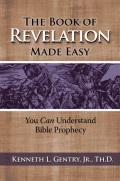
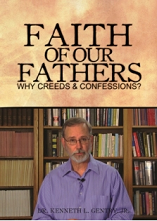
February 5, 2021
MY HYPER-PRETERIST FRUSTRATIONS (1)
 PMW 2021-011 by Kenneth L. Gentry, Jr.
PMW 2021-011 by Kenneth L. Gentry, Jr.
Well, I promised myself I would never engage in a land war in Asia. But against my better judgment, here I go. In this two-part series I will briefly respond this one last time to Don Preston’s responses to my series on Matthew 24:3. I will not be interacting much with his exegetical errors, since I am working on a commentary where these should be exposed. Rather, this article and the next one function more as a testimonial on my part. That is, it explains why I do not like interacting with Hyper-preterists.
It is totally frustrating to read their challenges and arguments. They live in a different world and have a whole new theology. And I guess in my Preston-diagnosed “desperation” I fear that they might pull out a ray gun, set it on “phase,” then fire a death-beam at me.
If Preston would just dispassionately present his arguments without all the exaggerations that would be fine. For instance, he claims that evangelical scholars who hold that the Apostles were confused in Matt. 24:3 judge the Apostles as “completely ignorant,” “totally ignorant,” suffering from “abject ignorance,” because they were “so ignorant,” “horribly confused,” “lamentably ignorant,” “amazingly dumb,” and “abysmally ignorant” in that they had “thick skulls,” were “dimwitted,” and “blithely ignorant.” But as I show in my four-part series on Preston’s views on Olivet, the arguments too often go overboard.
I must confess, though, that I am pleased that Preston titles his own article series properly as: “Confused, Confusing, Desperate.” Though I am not entirely sure he meant that as an apology for the character of his articles.
So, in this and the next article I will just quickly highlight a few of Preston’s frustrating challenges, then offer a very brief counter to them. Again, I will not be rebutting his exegetical arguments since I am dealing with those in a larger book, Olivet in Context: A Commentary on Matthew 21-25.
PRESTON’S FIRST ARTICLE
Preston:
“What point is [Gentry] trying to make by commenting on my denominational affiliation? Is there a logical connection?”
My reply:
Most of my audience is made up of Reformed Christians. Therefore, my point was to alert my readers to a larger complex of doctrinal errors that may help explain the Hyper-preterist error itself. It does not prove it, but it does suggest a pattern of theological error. Thus, it forewarns the unwary reader that danger may lurk ahead.
The Church of Christ has numerous troubling doctrines — several impacting the doctrine of salvation itself. For instance, the Church of Christ is (1) Arminian; (2) holds to works salvation; (3) does not accept the security of the believer, and (4) believes that believers’ baptism (by immersion) is necessary for salvation. These are big mistakes; they are not secondary issues. And they result from poor interpretations of various Scriptures. Such things should send up red flags warning that the Church of Christ has a tendency to wrongly interpret Scripture.
I do not know if Preston holds to all of the doctrines associated with the Church of Christ or not. But I suspect that he taught them along the way in his pastoral ministry and probably does still believe them.
Have We Missed the Second Coming: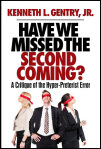
A Critique of the Hyper-preterist Error
by Ken Gentry
This book offers a brief introduction, summary, and critique of Hyper-preterism. Don’t let your church and Christian friends be blindfolded to this new error. To be forewarned is to be forearmed.
For more Christian educational materials: www.KennethGentry.com
Preston:
“Mr. Gentry makes a huge leap in logic, when he claims that because the apostles were surprised, that this necessary [sic] means they were confused. But, surprise does not suggest ignorance, and does not demand confusion.”
My reply:
I did not argue that; so there is no leap of logic. In fact, this statement by Preston is a leap of logic. What I actually said was, the Apostles’ “surprise at his prophecy led to their confusion.” What is illogical about that? Their surprise led to the confusion; it did not “demand” it.
Preston:
“Another thing that Gentry must answer is why would the apostles think about the end of the Christian age, when Jesus predicted the destruction of the Temple? That temple did not represent the Christian age! Gentry knows this! And yet, he insists that Jesus’ prediction prompted the apostles to think, not of the end of the age that the Temple represented, but the end of the Christian age which had no connection to that temple!”
My reply:
Preston is not only misreading my view of history into this but assuming his view is the Apostles’ view. I do not argue that “the end of the age” is “the end of the Christian age”; rather I argue that it is the end of world history. His “two-age” analysis of Scripture dramatically differs from my evangelical “two-age” view (see below).
Preston:
“Gentry once applied Daniel 12:2 to the end of human history resurrection of human corpses out of the ground…. However, he has radically changed his position on this.”
My reply:
I have certainly changed my position on this passage, as I myself have stated. I would imagine that Preston and others have changed some of their positions from time to time — unless they are omniscient, inspired, and inerrant in their presentations. But my “radically changed” view is not that radical. That is, it is not a doctrinal change in my theological system, but an interpretive change on one passage of Scripture. After all, theologically I still hold to a future bodily resurrection — though not based on this passage. Had I changed my view to say I no longer believe in a physical resurrection, that would have been radical. My concerns with Preston’s views is not so much his different approaches to certain Scriptures, but the theology he draws from them. His theology is “radical” in its opposition to historic orthodoxy.
Preston:
Preston (correctly) quotes me as stating: “In the first two of my four-article presentation, however, I must express my frustration with Preston’s attitude. This attitudinal problem almost invariably annoys anyone who is not a Hyper-preterist (and there are 7.2 billion of those people).” Then he complains “Notice that [“he,” sic] resorts to an appeal to the popular / majority view (argumentum ad populum). How can 7.2 Billion people who are not preterists, be wrong?? Mr. Gentry, there are almost 2 billion Muslims in the world, all of whom reject Jesus as the Son of God. ”
My reply:
Apparently, Preston was born without a sense of humor. My statement was simply an amusing way to say Preston’s attitude frustrates many people. I was not being literal. I would imagine that very few of the 2 billion Muslims in the world have even read Preston’s books and articles, much less are put off by his attitude. I am glad he did not waste a lot of time researching global population statistics to find out the world population was slightly different from the 7.2 billion figure that I gave.
But I must move along.
PRESTON’S SECOND ARTICLE
Preston:
“Gentry’s comments [about the cultic tendency in Hyper-preterism] here are nothing but an attempt to ‘poison the well’, i.e. to poison the mind of his readers. After all, everyone knows the Mormons are false! Preterists are like those misguided, cultic Mormons!”
My reply:
I am not attempting to poison the well; I am warning would-be readers of the aberrational nature of his theology. I am warning people that they should be aware that he is outside of mainstream evangelical theology. They can read on, if they like. They may also end up not liking standard evangelical doctrine either. But if they read my post, they will at least be alerted to the fact that they are reading heterodox theology. I have had numerous contacts from folks who were not aware of the full implications of Hyper-preterism, and who stepped back before fully endorsing the system.
Preston:
Regarding my observations on Preston’s presentation at Criswell College, he writes:
“it is almost amusing to read Gentry say that my lesson caused perplexity among some of the listeners. Read what Gentry admits about his own views on Revelation: ‘The remarkable nature of our preterist assertion regarding the events of Revelation is met with bewilderment by most evangelicals today. Yet the evidence is there for all to see.’ (Beast of Revelation, p. 26). So, Gentry admits that his views are met with ‘bewilderment’ (you know, kinda like the ‘bewilderment’ that he says listeners of my Criswell presentation felt), and yet, he urges his readers to simply look at the evidence that he adduces before dismissing his conclusions.”
My reply:
Preston is once again confused about what I stated and what my point was (thus, I do believe he is “Confused, Confusing, Desperate”). In the first place, I never used the word “bewilderment” regarding the impact of his Criswell presentation. And he quotes my article that shows I did not do so. I was talking about his presentation not his position. In my Beast book I was referring to a position that would cause bewilderment if only briefly announced “out of the blue.” I was not talking about my presentation of the position, as if I thought people would be bewildered by the way I argue the point. Someone can be correct in his position but awkward and confusing in his presentation. Preston obviously thinks he is correct, and that is fine — for why would he write something he believed was incorrect?
The problem I noted (which was based on the discussions afterwards) was that Preston’s presentation struck the scholarly panel as confused and meandering. They did not see his point. Thus one noted scholar there commented: “What was that all about?”
It is true (as he notes elsewhere) that we do have to connect the dots in Scripture. But we have to correctly connect the right dots. Which is what he failed to do in my opinion — and in the opinion of the other scholar-presenters at Criswell.
Preston:
Preston cites my statement: “Preston, with his innovative Hyper-preterist theological construct governing his every word, thought and deed, challenges the charge that the disciples are confused here. As he does so, he admits that he has set himself against ‘a consensus among the commentators’ (p. 33), ‘most commentators’ (p. 34), ‘most commentators’ (p. 35), a ‘widespread agreement among commentators’ (p. 47), ‘the great consensus of very learned men through the ages’ (p. 93), and the ‘commentators [who] commonly ascribe’ (p. 105). Of course, in itself this is not deadly.” Then he replies: “Once again, Gentry offers a logical fallacy. He says that I stand in opposition to ‘longstanding and widespread scholarly consensus.’ This is an argumentum ad verecundiam (an appeal to the authorities).”
My reply:
Preston once again is confused: he does not understand what I am saying. I am quoting Preston himself, showing that he recognizes he is outside of the consensus of commentators. But then I clearly state: “Of course, in itself this is not deadly.” My stating that Preston is outside of a scholarly consensus is not an attempt at a logical argument against his position on my part. iI is simply a warning to evangelical Christians that he is set against a widespread evangelical scholarly consensus on this matter. Furthermore, he tends to argue against my position as if I am the only one who holds it. It is certainly true that if I rested my case on this, then my argument would be fallacious.
Preston:
He cites my statement from my book The Beast of Revelation, where I write: “The view that I shall present and defend below is contrary to what the vast majority of Christians believe today.” He sees this a contradictory to my observations of his being outside of doctrinal orthodoxy.
My reply:
My statement is certainly true — and I stand behind it. But my position is not contrary to historic orthodoxy. It is within the realm of theological orthodoxy as understood by the historic Christian church, for it maintains a future Second Coming, bodily resurrection, etc. I was only stating that the majority of Christians in the pews today do not hold to a preterist analysis of Revelation. But this is not a matter of theological orthodoxy. There is a world of difference between the two concepts. My concern with Preston is not that we count noses, but that he is outside of and opposed to historic, Christian doctrine.
[image error]For more information and to order click here.
" data-medium-file="https://postmillennialismtoday.files...." data-large-file="https://postmillennialismtoday.files...." class="alignright size-full wp-image-211" src="https://postmillennialismtoday.files...." alt="" />Perilous Times: A Study in Eschatological Evil (by Ken Gentry)
Technical studies on Daniel’s Seventy Weeks, the great tribulation, Paul’s Man of Sin, and John’s Revelation.
See more study materials at: www.KennethGentry.com
Preston:
“Is Gentry espousing a view that is diametrically opposed to the Westminster Confession of Faith, and other creeds? Answer: Absolutely.”
My reply:
This is not only mistaken in itself but irrelevant. In the first place, technically speaking, the Westminster Confession of Faith is not an ecumenical creed defining historic Christianity; it is a denominational confession defining historic Presbyterianism. For instance, Presbyterians hold to infant baptism, but do not believe that if you deny it you are outside of orthodox Christianity. Rather, denying paedobaptism sets you outside of Presbyterianism, which a Presbyterian minister should not be.
Second, my view of Revelation is not contrary to the Westminster Confession. The Confession does not take a position on the book of Revelation. In fact, one of the writers of the Confession was John Lightfoot who holds strongly to preterism and has even been approvingly cited by Hyper-preterists.
Preston:
Regarding my view of the book of Revelation: “Does Gentry declare that the almost universal historical view of the church throughout has been wrong? Is Gentry presenting a view that is at odds with the historical (orthodox) view of the church? Answer: Undeniably.”
My reply:
Once again, Preston is confused, mistaken, and irrelevant. One’s view of the book of Revelation is not a matter of creedal orthodoxy, for the ecumenical creeds do not commit to a particular view on the book. Notice that he confuses an “historical” view with an “orthodox” view. Many historical (i.e., long and broadly held) views are not matters of theological orthodoxy.
Preston:
“Is Gentry presenting a view that is ‘innovative’? Without any doubt!”
My reply:
Preston is confused again. My concern with Hyper-preterism is not a matter of a new or innovative way of understanding a particular passage of Scripture. The “innovative” problem with Hyper-preterism is that it changes foundational doctrines, not that it holds a minority view on several particular passages of Scripture. My problem with Preston is that his theology is wrong, not necessarily that he wrongly understands certain passages of Scripture. For instance, above I stated that I changed my view on Daniel 12:2. But in the process I did not change my view on a future, literal resurrection of the body. Thus, I changed my understanding of a particular passage, but not my theology.
Preston:
In rebutting me, he writes that I believe that: “The great consensus of very learned men through the ages … have affirmed that the apostles were so lamentably ignorant, or confused.”
My reply:
My point in citing Preston’s own statement was to expose its over-exaggeration. It is quite mistaken to say that “the great consensus of very learned men through the ages … have affirmed that the apostles were so lamentably ignorant, or confused.” Who says they were lamentably ignorant? Confusion does not necessarily entail lamentable ignorance.
And if you read my article, you will see how Preston emphasizes this mistaken reading of evangelical scholars. In his book, he claims that commentators who believe the disciples were confused in Matthew 24:3, believe that the disciples were “completely ignorant,” “totally ignorant” (p. 28, ¶3, 4, 5), suffering from “abject ignorance” (p. 29 ¶3), were “so ignorant” (p. 25 ¶2), “horribly confused” (p. 92, 117), “lamentably ignorant” (p. 93), “amazingly dumb” (p. 34), “dense” (p. 81), “abysmally ignorant” (p. 119), had “thick skulls” (p. 103), were “dimwitted” (p. 103), and “blithely ignorant” (p. 163). He has really gone overboard here!
In his writings, he frequently highly commends himself as presenting positions that are “obvious,” “logical,” “proven beyond dispute,” “unquestionable,” “indisputable,” “undeniable,” “undeniably true,” “irrefutably true,” and so forth. He charges me (and others who disagree with him) with “glaring logical fallacy,” with holding positions that are “remarkable — and illogical,” promoting “amazingly bad” arguments, and so forth. Not only so, but he also repeatedly provides a psychological analysis regarding my rejecting his views. He repeatedly charges that I am “desperate,” as even the title of his rebuttal series demonstrates. Perhaps I need to change my blood pressure meds to ease my desperation?
Unfortunately, it is 5:30 am. I am weary. Thus, I will continue this in my next article when I am tanned, rested, and ready.
Click on the following images for more information on these studies:



February 2, 2021
THE MILLENNIAL REIGN AND ITS END
 PMW 2021-010 by Milton S. Terry (Biblical Apocalyptics)
PMW 2021-010 by Milton S. Terry (Biblical Apocalyptics)
Gentry note: In this article I continue presenting some helpful postmillennial material from Milton S. Terry (1840–1914) as presented in his book, Biblical Apocalyptics. Below I will be directly citing his material, except that I will break it into smaller paragraphs (as I noted was necessary in my last article).
So here is a direct citation of Biblical Apocalyptics, pp. 453–54:
The five scenes of the millennial period thus far presented form a closely connected series and are to be thought of, not as chronologically successive, but rather as simultaneous and supplementary in their logical relations. Thus, the moving forth of the great Conqueror (19:11–16) results in the great slaughter of the numerous enemies of God (19:17,18); this involves at the same time the destruction of the beast and the false prophet (19:19–21) and the binding of Satan (20:1–3). These are different aspects of a world-wide conquest, for the Messianic King of Old Testament prophecy is to “have dominion from sea to sea and from the river unto the ends of the earth” (Psalm 72:8).
[image error]For more information and to order click here.
" data-medium-file="https://postmillennialismtoday.files...." data-large-file="https://postmillennialismtoday.files...." class="alignright size-full wp-image-209" src="https://postmillennialismtoday.files...." alt="Navigating the Book of Revelation: Special Studies on Important Issues" />Navigating the Book of Revelation (by Ken Gentry)
Technical studies on key issues in Revelation, including the seven-sealed scroll, the cast out temple, Jewish persecution of Christianity, the Babylonian Harlot, and more.
See more study materials at: www.KennethGentry.com
But the great events symbolized are not sharply separated from each other in time. Most of them, if not all, are coetaneous and extend through the entire period of the Messianic era, the symbolical thousand years. Through what historic stages the conflict is to pass; what particular forms of government may arise and exhibit more or less of the spirit of the beast and the dragon; what mysteries of iniquity may work against Jehovah and against his Anointed during the thousand years — these and such like are not written and their details do not seem to come within the scope of prophetic revelation. But the millennial era of conflict and triumph is prophetically presented in one great field of view.
7,8. When the thousand years are finished Satan shall be loosed — The millennial era is to end with the utter defeat and destruction of the old serpent, the Devil, thus fulfilling at the last the prediction of Genesis 3:15. With this final defeat of Satan all his allied forces are also destined to perish (cp. Matt. 25:41). In order to enhance the final and decisive character of this victory over Satan the writer represents him as loosed out of his prison, in which he had been shut up for the long period (cp. verse 3). The old enemy is thus granted a second probation in order to show that “the deceiver of the whole world” (12:9) is at the end, as from the beginning, “a liar and the father thereof” (John 8:44).
His going forth once more to deceive the nations which are in the four corners of the earth implies that the millennial era, with all its world-wide triumphs, is not destined so to eliminate all evil from among men, but that at the very last there will be found in all quarters of the earth those who can be deceived and led by Satan into conflict with the people of God. These nations, which are thus marshaled to the war against the Most High, are called by the symbolical names Gog and Magog, taken from a similar prophetic picture in the Book of Ezekiel (cp. Ezekiel 38:2). Any attempt to find in these symbolical names and pictures of battle a reference to particular peoples and provinces of the earth must needs be utterly futile. Both here and in Ezekiel we have an ideal scene.
The number of those gathered for the final battle is as the sand of the sea. In Ezekiel they are represented as “many people,” “a great company and a mighty army.” They come up “against my people of Israel, as a cloud to cover the land.” They are “gathered out of many people against the mountains of Israel.” The corresponding passage in Ezekiel (38:18–23) deserves transcription here, as showing beyond question its metaphorical character:
“It shall come to pass in that day, when Gog shall come against the land of Israel, saith the Lord Jehovah, that my fury shall come up into my nostrils. For in my jealousy and in the fire of my wrath have I spoken. Surely in that day there shall be a great shaking upon the land of Israel; so that the fishes of the sea and the fowls of heaven and the beasts of the field and all creeping things that creep upon the earth and all the men that are upon the face of the earth, shall shake at my presence and the mountains shall be thrown down and the steep places shall fall and every wall shall fall to the ground. And I will call for a sword against him unto all my mountains, saith the Lord Jehovah: every man’s sword shall be against his brother. And I will plead against him with pestilence and with blood; and I will rain upon him and upon his hordes and upon the many peoples that are with him, an overflowing shower and great hailstones, fire and brimstone. And I will magnify myself and sanctify myself and I will make myself known in the eyes of many nations; and they shall know that I am Jehovah” (Ezekiel 38:18–23).
9. Went up over the breadth of the land — The language has allusion to Habakkuk 1:6, where the Chaldean armies are spoken of as “marching through the breadth of the land to possess the dwelling places which are not their own.”
Compassed the camp of the saints about — The imagery here is of a fortified camp rather than of a moving army, as in 19:14, thus affording variety of description and at the same time conforming to the corresponding picture in Ezekiel of Israel dwelling safely in the day when the armies of Gog come up against their land (cp. Ezekiel 38:14).

Blessed Is He Who Reads: A Primer on the Book of Revelation
By Larry E. Ball
A basic survey of Revelation from an orthodox, evangelical, and Reformed preterist perspective. Ball understands John to be focusing on the destruction of Jerusalem and the temple in AD 70. Insightful. Easy to read.
For more Christian studies see: www.KennethGentry.com
And the beloved city — The figure is that of a city with a camp outside of it, as if set there for defense. The city is the new Jerusalem, already mentioned in 3:12, but to be more fully described in following visions. It is called the beloved city in allusion to such scriptures as Jeremiah 11:15; 12:7 and Psalm 78:68. In point of fact this beloved city is to be understood as descending from heaven to earth (21:2,3,10) during the entire period of the millennial era; but the artistic proprieties of the book required that the full description of the city of the saints follow the record of the overthrow of all her foes.
Fire came down … and devoured them — Allusion to the event in Elijah’s history (2 Kings 1:10,12), which has been already referred to in these visions (cp. 11:5). Thus these saints have only to stand still and see the miraculous judgment of God upon their enemies. Thus will God ultimately crush Satan under their feet (Romans 16:20).
10. Devil … cast into the lake of fire — Not now “cast down to the earth” (12:9,13), where he may still persecute the saints of God, but cast into final and irretrievable perdition and visited with the terrible fury which Ezekiel thus portrays: “I will rain upon him and upon his bands and upon the many people that are with him, an overflowing rain and great hailstones, fire and brimstone” (Ezekiel 38:22; compare also Genesis 19:24).
Where are also the beast and the false prophet — As described in 19:20. Tormented day and night unto the ages of the ages — Another form of expressing the perpetual torment so vividly portrayed in 14:10,11. See the notes on those verses.
These verses 7–10 depict the last great struggle of Satan and his forces to overcome the saints of God and their overwhelming defeat before the manifested power of heaven. The obvious purpose is to show the final and decisive victory of the seed of the woman over their ancient foe. It is a great symbolic picture and its one great teaching is clear beyond the possibility of doubt or misunderstanding, namely, that Satan and his forces must all ultimately perish. This is written for the comfort and confidence of the saints. But that final victory is in the far future, at the close of the Messianic age and it is here simply outlined in apocalyptic symbols. Any presumption, therefore, of determining specific events of the future from this grand symbolism must be regarded as in the nature of the case a species of worthless and misleading speculation.
 The Beast of Revelation (246pp); Before Jerusalem Fell: Dating the Book of Revelation (409pp); Navigating the Book of Revelation: Special Studies on Important Issues (211pp).
The Beast of Revelation (246pp); Before Jerusalem Fell: Dating the Book of Revelation (409pp); Navigating the Book of Revelation: Special Studies on Important Issues (211pp).
In the Logos edition, these volumes by Ken Gentry are enhanced by amazing functionality. Important terms link to dictionaries, encyclopedias, and a wealth of other resources in your digital library. Perform powerful searches to find exactly what you’re looking for. Take the discussion with you using tablet and mobile apps. With Logos Bible Software, the most efficient and comprehensive research tools are in one place, so you get the most out of your study.
For more study materials, go to: KennethGentry.com
Kenneth L. Gentry Jr.'s Blog
- Kenneth L. Gentry Jr.'s profile
- 85 followers



